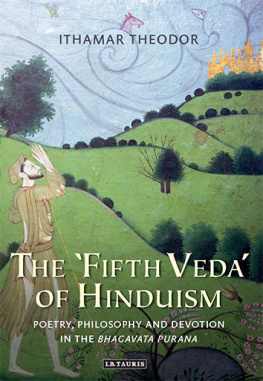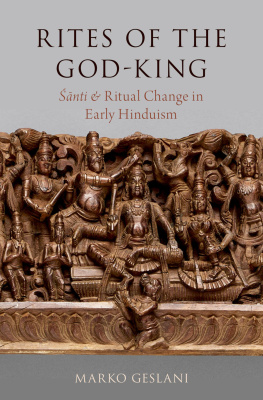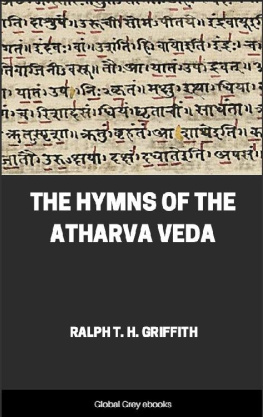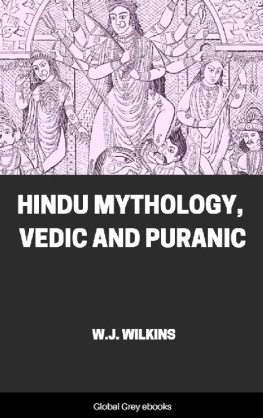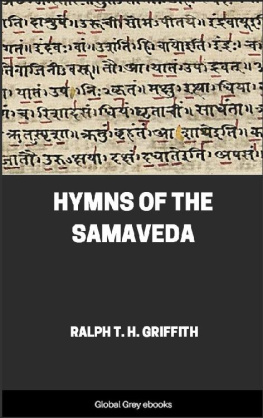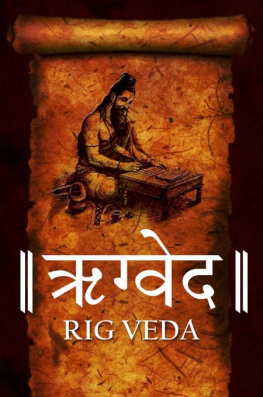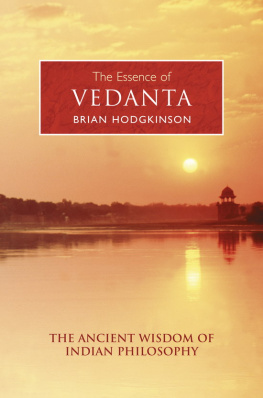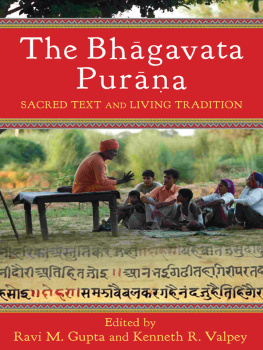WENDY DONIGER was born in New York in 1940 and trained as a dancer under George Balanchine and Martha Graham before beginning the study of Sanskrit at Raddiffe College in 1958. She holds doctoral degrees in Sanskrit from Harvard University and Oriental Studies from Oxford University, and is now the Mircea Eliade Professor of the History of Religions at the University of Chicago. Her publications include Shiva: The Erotic Ascetic; The Origins of Evil in Hindu Mythology; Women, Androgynes and Other Mythical Beasts; Dreams, Illusion and Other Realities; Other Peoples Myths: The Cave of Echoes; Mythologies, an English edition of Yves Bonnefoys Dictionnaire des Mythologies; and, most recently, Splitting the Difference: Gender and Myth in Ancient Greece and India (1999), The Bedtrick Tales of Sex and Masquerade (2000) and The Woman Who Pretended to Be Who She Was (2004). She has also translated Hindu Myths and (with Brian K. Smith) The Laws of Manu for Penguin Classics.
The Rig Veda
An Anthology
One hundred and eight hymns, selected,
translated and annotated by
WENDY DONIGER
PENGUIN BOOKS
PENGUIN BOOKS
Published by the Penguin Group
Penguin Books Ltd, 80 Strand, London WC2R ORL,England
Penguin Group (USA) Inc., 375 Hudson Street, New York, New York 10014, USA
Penguin Group (Canada), 10 Alcorn Avenue, Toronto, Ontario, Canada M4V 382
(a division of Pearson Penguin Canada Inc.)
Penguin Ireland, 25 St Stephens Green, Dublin 2, Ireland
(a division of Penguin Books Ltd)
Penguin Group (Australia), 250 Camberwell Road,
CamberwelL Victoria 3124, Australia (a division of Pearson Australia Group Pty Ltd)
Penguin Books India Pvt Ltd, 11 Community Centre, Panchsheel Park, New Delhi 110 017, India
Penguin Group (NZ), cnr Airborne and Rosedale Roads, Albany,
Auckland 1310, New Zealand (a division of Pearson New Zealand Ltd)
Penguin Books (South Africa) (Pty) Ltd, 24 Sturdee Avenue, Rosebank 2196, South Africa
Penguin Books Ltd, Registered Offices: 80 Strand, London WC2R ORL,England
www.penguin.com
This selection first published in this translation 1981
5
Copyright Wendy Doniger OFlaherty, 1981
All rights reserved
Except in the United States of America, this book is solarsubject to the condition that it shall not, by way of trade or otherwise, be lent,
re-sold, hired out, or otherwise circulated without the publishers prior consent in any form of binding or cover other than that in which it is published and without a similar condition including this condition being imposed on the subsequent purchaser
For
Tatyana Yakovlena Elizarenkova
and
Frits Staal
Contents
Introduction
THIS is a book for people, not for scholars. Real scholars will read the Rig Veda in Sanskrit; would-be scholars, or scholars from other fields, will fight their way through the translations of Geldner (German), Renou (French), Elizarenkova (Russian) and others; and it is so complex that most serious translations have been rendered unreadable by critical apparatus.
Yet, this need not be so. One need not read all of the Rig Veda to enjoy its beauty and wisdom; and since the text is itself an anthology of separate, individually complete hymns, a selection destroys no continuity of the original. Moreover, despite its awesome and venerable reputation, the Rig Veda proves surprisingly accessible when one has a little help from ones friends. By standing upon the shoulders of the many by using the available scholarship, I have tried to make the best educated guess on the many problematic points; and by citing this scholarship in the bibliographies, I invite the would-be scholar to make a better guess. For although this is not a book for scholars, it is a book from scholars, from the many painstaking Indian commentators (Yska, Saunaka, Syana and lesser figures) and European interpreters (beginning with Max Mller) who were driven by a sharp need to fathom this fascinating work.
Having resolved upon a working method, it was necessary to rationalize a selection. My field was automatically limited by the realization that I would be forced to exclude all the hymns that I could not decipher (or that I could only render intelligible by means of a commentary too complex for the present purpose) and that I would indulge myself by excluding all those that I found boring. This is certainly not a representative anthology of the Rig Veda except in the sense that it is representative of my taste and of the taste of those scholars whose works I have so shamelessly plundered; it is the product of serendipity and hot tips from my friends and colleagues, living and long dead. It is a selection of what I have found to be beautiful, interesting, and profound in the Rig Veda, following the leads of my elders and betters. In number, these 108 (a holy number in India)an introduction to a significant number of hymns in many diverse veins. Many of these centre upon mythology, which interests me most; many delve into philosophy (and therefore come from the latest books of the Rig Veda, the first and last), which has interested students of Indian thought most; many explore the symbolism and mechanism of Vedic ritual, which has interested historians of religion most; many are included for the sake of the light they shed on details of daily life, which interests historians and sociologists most, and many for the sake of their poetry.
I have kept the notes to a minimum, and avoided the tautological type entirely (This is the name of a sage, Here the hymn switches from the singular to the plural), for these seem to me mere automatic reflexes and conventions into which translators often lapse, like hosts showing their guests a new house (This is the kitchen, This is the bedroom). I have also resisted, often with great difficulty, the powerful temptation to explain the Rig Veda by looking backward or forward, to draw upon the ancient Indo-European civilization out of which it grew or to show how Vedic ideas developed in post-Vedic India. Such explanations are fascinating and often useful, but they would have doubled the length of my notes and would, in any case, have distracted the reader from the particular moment in time when these hymns were composed, the moment that I strove to capture in my translations.
The skeletal nature of the critical apparatus is also intended to spare the reader a painful and confusing glimpse behind the curtain into the translators messy workshop, to gloss over a number of the agonized (and often unsatisfying) decisions that were necessary in rendering the Sanskrit into a comprehensible form of English. The magnitude of the problem faced by the translator of the Rig Veda is immediately evident from the disgruntled mumblings, apologies, and cris de cur that slip out of the notes in the extant translations This hymn is one of the most obscure in the whole Rigveda; I can make no sense at all of the second line; mot inconnu; Ein dunkles Lied; Nicht ganz klar. Translation should be exempt from fault-finding, but it is hard to resist the temptation to wonder where the obscurity comes into play along the long, fragile thread that connects the original with the translation. Is it an obscure transmission, or an obscure reception?





